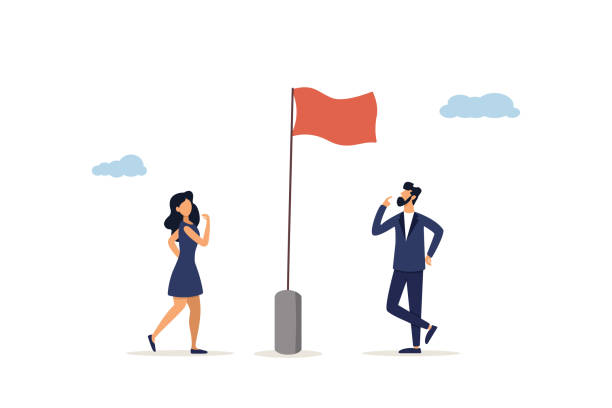Red Flags In A relationship can be one of life’s most rewarding, but also one of its most challenging aspects. When you’re in love, it’s easy to overlook certain behaviors that may seem harmless initially but could turn into serious problems.
These early warning signs, or “red flags,” are often subtle at the beginning, but ignoring them can lead to heartbreak, emotional damage, and even toxic or abusive situations.
In this article, we’ll explore the key red flags you shouldn’t ignore in a relationship. Understanding these signs will help you protect your emotional health and make better choices in your romantic life.

What Are Red Flags in a Relationship?
Red flags are warning signs that something may be wrong in a relationship. They’re behaviors, patterns, or attitudes suggest a lack of respect, trust, emotional safety, or compatibility.
Red flags can be small at first, but they often grow more obvious as the relationship progresses. If left unaddressed, they can lead to toxic dynamics, emotional harm, or even abuse.
Why people ignore warning signs, Fear of Being Alone:
It can feel better to stay in a bad relationship than to be alone. Hoping They Will Change – Believing that a partner’s negative traits will improve with time or effort.
Emotional Investment When you’ve put a lot of time and energy into a relationship, it’s hard to walk away.
Love and Attachment:
Emotional ties can cloud judgment and cause you to overlook bad behavior. Self-Esteem: If you don’t think you deserve better, you might put up with bad treatment.
Major Red Flags in a Relationship
1. Insufficient communication
Open and honest communication is the foundation of a healthy relationship. If your partner avoids difficult conversations, shuts down emotionally, or dismisses your feelings, it’s a major red flag.
Signs:
They give you the silent treatment.
They change the subject when you bring up issues.
They refuse to express how they feel.
👉 Why It’s a Problem: Without communication, misunderstandings build up, and resentment grows over time.
2. Controlling Behavior
A healthy relationship allows both partners to maintain their independence. If your partner tries to control what you wear, who you spend time with, or how you spend your time, that’s a serious red flag.
Signs:
They monitor your phone, social media, or whereabouts.
They try to isolate you from friends and family.
They insist on making all the decisions.
👉 Why It’s a Problem: Control leads to a loss of personal freedom and can escalate into emotional or physical abuse.
3. Jealousy and Possessiveness
While a little jealousy is natural, excessive jealousy and possessiveness are signs of insecurity and a lack of trust.
Signs:
They get angry when you talk to someone of the opposite sex.
They accuse you of cheating without evidence.
They constantly check up on you or question your loyalty.
👉 Why it’s a problem: A healthy relationship depends on trust. Without it, paranoia and resentment will grow.
4. Lack of Respect
In any relationship, respect is a must. A clear red flag is when your partner treats you poorly, mocks your opinions, or violates your boundaries.
Signs:
They mock you in front of other people. They either ignore your concerns or roll their eyes. They disregard your need for privacy and space. 👉 Why It’s a Problem: A lack of respect breeds resentment and erodes emotional safety
5. Constant Criticism
Constructive feedback is normal, but constant criticism and nitpicking can damage self-esteem and create an unhealthy power dynamic.
Signs:
They criticize your appearance, intelligence, or decisions.
They point out your flaws more than your strengths.
They make you feel like nothing you do is good enough.
👉 Why It’s a Problem: Constant criticism makes you feel inadequate and unworthy of love.
6. Emotional Unavailability
If your partner is emotionally distant or unable to express vulnerability, it creates an imbalance in emotional connection.
Signs:
They avoid deep conversations about feelings.
They shut down when you express your emotions.
They are physically present but emotionally detached.
👉 Why It’s a Problem: Without emotional connection, the relationship will feel hollow and one-sided.
7. Gaslighting
Gaslighting is a form of emotional manipulation where your partner makes you question your reality, memory, or feelings.
Signs:
They tell you that you’re overreacting or imagining things.
They deny what they’ve done or said. They make you feel like you’re going crazy.
👉 Why It’s a Problem: Gaslighting undermines your confidence and sense of reality, making you dependent on the other person.
8. Lack of Support
A loving partner should support your goals, dreams, and personal growth. If they undermine or sabotage you, that’s a red flag.
Signs:
They disregard your goals. They discourage you from trying new things.
They make you feel bad for trying to achieve personal goals. 👉 Why It’s a Problem: Lack of support leads to feelings of isolation and frustration.
9. Blaming and Deflecting Responsibility
If your partner refuses to take responsibility for their actions or constantly blames you for problems, it creates a toxic dynamic.
Signs:
They say, “You’re too sensitive” or “You’re overreacting.”
They refuse to apologize when they’ve done something wrong.
They twist situations to make you feel guilty.
👉 Why It’s a Problem: A lack of accountability makes it impossible to resolve conflict or build trust.
10. Physical or Verbal Abuse
Any form of abuse—whether physical, verbal, emotional, or sexual—is an immediate red flag and a reason to leave the relationship.
Signs:
They hit, slap, or push you.
They yell, insult, or threaten you.
They use intimidation to control you.
👉 Why It’s a Problem: Abuse is never acceptable. It creates fear and long-term emotional damage.

How to Respond to Red Flags
✅ 1. Rely on Your Senses.
If something feels wrong, it probably is. Don’t ignore your gut feelings.
✅ 2. Set Boundaries
Communicate your needs and establish clear limits. A healthy partner will respect them.
✅ 3. Seek Support
Talk to trusted friends or a therapist about your concerns. They can provide clarity and perspective.
✅ 4. Don’t Try to “Fix” Them
You can’t change someone who isn’t willing to change. Focus on protecting your emotional well-being.
✅ 5. Be Willing to Walk Away
If red flags persist or worsen, don’t be afraid to leave the relationship. The most important thing is to ensure your physical and emotional security.
FAQs
1. Why do I feel uncertain about my relationship even though nothing is wrong?
A common symptom of anxiety, overthinking, or a fear of vulnerability is doubt, even when there are no obvious issues. Sometimes, our minds create problems to protect us from potential emotional pain, even when the relationship itself is stable.
2. Could my doubts be a sign of underlying issues I’m ignoring?
It’s possible. Doubts can reflect deeper issues like emotional incompatibility, unmet needs, or poor communication. However, if the relationship feels secure and your partner is supportive, the doubts may be more about personal insecurities than actual problems.
3. How can I tell if my doubts are anxiety or a genuine concern?
Doubts caused by anxiety tend to be vague, repetitive, and based on hypothetical scenarios (“What if they leave me?”). Genuine concerns tend to be more specific and rooted in observable patterns or behaviors (“They’ve been distant lately”).
4. Is it normal to doubt a relationship even if I love my partner?
Yes, it’s completely normal. Love doesn’t erase uncertainty or personal insecurities. Many people experience moments of doubt due to stress, personal growth, or fear of emotional exposure.
5. Could past relationship trauma be making me doubt this relationship?
Yes, unresolved trauma from past relationships can create trust issues and lead you to project old wounds onto your current partner. Your mind may be trying to protect you from getting hurt again, even if there’s no present threat.
6. How can I stop overthinking and ease my doubts?
Try grounding exercises, journaling, or open communication with your partner. Identifying whether the doubt is rooted in reality or internal fear can help you distinguish between legitimate concerns and anxious thoughts.
7. What if my doubts are a sign that I’m not ready for commitment?
Doubts about commitment could mean you need more time to feel secure or that you value your independence. It’s important to reflect on whether you feel pressured or if you simply need to strengthen your emotional connection.
8. Is it possible that I’m self-sabotaging my relationship?
Yes, self-sabotage often stems from low self-worth or fear of abandonment. If you find yourself creating problems where none exist or pulling away when things are good, you might be protecting yourself from perceived rejection.
9. Can therapy help me understand my relationship doubts?
Absolutely. A therapist can help you explore the root causes of your doubt, differentiate between fear and genuine concern, and develop healthier communication and coping strategies.
10. How can I communicate my doubts to my partner without hurting them?
Be honest but gentle. Use “I” statements to avoid blame (e.g., “I’ve been feeling unsure lately and I’m trying to understand why”). Focusing on your feelings rather than their actions can create a safe space for dialogue.

Conclusion
Red flags in a relationship are not just minor issues; they are warnings that the relationship may not be emotionally safe or sustainable. If you recognize any of these signs in your relationship, take them seriously.
Love should feel safe, supportive, and nurturing, not confusing, painful, or draining. Know that you are deserving of a relationship based on mutual respect, trust, and emotional safety. Trust yourself.



2 thoughts on “Red Flags In A relationship(6 Charming Signs)”